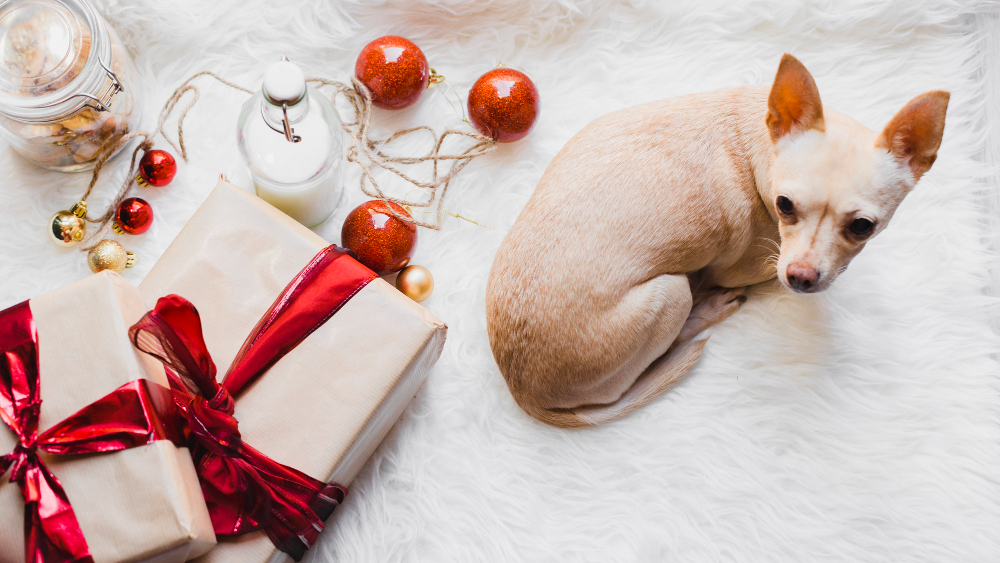Keeping Your Dog Safe and Healthy During the Festive Season

The holiday season brings a special set of challenges when it comes to keeping our pets safe, particularly from toxic foods and plants. During this festive time, our homes are filled with tempting treats and seasonal decorations that aren’t typically around during the rest of the year.
Curious pets, especially dogs, are more likely to come across and ingest these potentially harmful items. The abundance of rich foods, sweets, and decorative plants like mistletoe and poinsettias means we need to be extra vigilant to prevent accidents and ensure our furry friends stay healthy throughout the celebrations.
Toxic Foods and Plants
Common Toxic Foods for Dogs
- Chocolate: Theobromine, a compound in chocolate, causes vomiting, diarrhea, hyperactivity, seizures, and even death.
- Raisins and Grapes: Even in small amounts, these seemingly innocent fruits can cause kidney failure in dogs.
- Onions and Garlic: Allium family members can cause hemolytic anemia (destruction of red blood cells) in dogs.
- Xylitol: This artificial sweetener in sugar-free products can cause a rapid drop in blood sugar, leading to liver damage and life-threatening complications.
- Alcohol: Alcoholic drinks can cause vomiting, diarrhea, and coordination issues, and the most severe issues can leave your dog in a coma.
- Fatty foods, like turkey skin, gravy, and rich desserts, can cause pancreatitis, a severe inflammation of the pancreas.
Signs & Symptoms of Grape and Raisins Toxicity in Dogs
Grapes and raisins are particularly dangerous for dogs. If you suspect your dog has ingested these fruits, seek immediate veterinary attention. Common symptoms of grape and raisin toxicity include:
- Vomiting
- Diarrhea
- Loss of appetite
- Lethargy
- Abdominal pain
- Dehydration
- Increased thirst and urination
How Long Does It Take for a Dog to Show Signs of Poisoning?
The time for a dog to show signs of poisoning varies. It depends on the toxin and the amount ingested. In some cases, symptoms may appear within an hour, while in others, it may take several days.
Immediate Steps to Take
If you suspect your dog has ingested something toxic, act quickly. Here are the immediate steps to take:
- Remove any remaining toxic substance from your dog’s reach.
- Collect any evidence (wrappers, plant material, etc.) to show your veterinarian.
- Contact your veterinarian, call a televet company, or the ASPCA Animal Poison Control Center immediately for guidance.
Contacting a Veterinarian
When you contact your vet or the ASPCA Poison Control Center, be ready to provide:
- Your dog’s breed, age, and weight
- The type and approximate amount of the substance ingested
- The time elapsed since ingestion
- Any symptoms your dog is exhibiting
Potential Household Hazards
Beyond food and plants, the holidays bring risks to your dog’s safety. You should be aware of these potential dangers and take appropriate precautions.
Decorations and Ornaments
Festive decorations, such as tinsel, ribbons, and ornaments, can tempt dogs to chew or eat them. If swallowed, these items can cause intestinal blockages or lacerations. Also, some decorations may have toxic substances or small parts that can choke.
Electrical Cords and Lights
Dogs may chew on electrical cords or strings of lights. This can cause shocks or burns. Ensure that all cords and lights are securely fastened and out of reach.
Candles and Open Flames
Candles and open flames can be a potential fire hazard if a curious or playful dog knocks them over. Always supervise your dog around open flames. Use flameless candles instead; they are safer.
Potpourri and Essential Oils
Many festive scents, such as potpourri and essential oils, can be toxic to dogs, if ingested. Keep these items out of reach and ensure they are stored safely.
Cleaning Products and Chemicals
During the holidays, people may use more cleaning products for chores. These substances can be harmful if ingested or inhaled by your dog. Store them securely and use pet-friendly cleaning products whenever possible.
Maintaining a Healthy Diet and Exercise Routine
The festive season is for indulgence, but you should keep a balanced diet and exercise for your dogs. This is key to their health.
Maintaining a Balanced Diet
Resist the temptation to overfeed your dog with table scraps or holiday treats. Sudden diet changes or too many treats can cause problems. They may lead to digestive issues, pancreatitis, or weight gain. Instead, stick to your dog’s regular diet. It should be balanced. You can give healthy treats but do so in moderation.
If you want to introduce new foods or treats during the holidays, do so gradually and in small amounts to avoid digestive upset. Additionally, ensure that any new treats or foods are safe for your dog’s specific dietary needs and restrictions.
Exercise and Mental Stimulation
The festive season can disrupt your dog’s exercise routine. It is vital for their well-being. Walks, playtime, and mental games will prevent boredom, bad habits, and weight gain. So, make a conscious effort to do them.
First Aid and Emergency Preparedness
Accidents or emergencies can occur during the festive season despite our best efforts. Basic first aid knowledge and an emergency kit can help keep your dog safe and reduce potential harm.
Basic First Aid Training
Consider taking a pet first aid course or familiarizing yourself with basic dog first aid techniques. This knowledge can be invaluable in minor cuts, burns, or choking incidents.
Creating an Emergency Kit
Assemble a pet emergency kit that includes essential items such as:
- Your veterinarian’s contact information
- Pet first aid supplies (bandages, antiseptic wipes, gauze, etc.)
- Copies of your dog’s medical records and vaccination history
- Medications your dog is currently taking
- Extra leash, collar, and ID tags
- Bottled water and non-perishable pet food
Pet insurance can support you in managing these health concerns by covering accident situations, routine check-ups, dietary consultations, and treatments if any weight-related issues arise.




